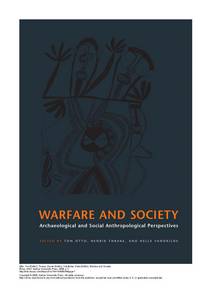Conceptions of warfare in Western thought and research: an introduction
Otto, Ton (2006) Conceptions of warfare in Western thought and research: an introduction. In: Otto, Ton, Thrane, Henrik , and Vandkilde, Helle , (eds.) Warfare and society : archaeological and social anthropological perspectives. Aarhus Unversity Press, Aarhus, Denmark, pp. 23-28.
![[img]](https://researchonline.jcu.edu.au/16686/4.hassmallThumbnailVersion/16686_Otto_Book_Cover.jpg)
|
Image (JPEG) (Book Cover)
- Cover Image
Download (62kB) |
|
|
PDF (Published Version)
- Published Version
Restricted to Repository staff only |
Abstract
[Extract] This section addresses the overall conceptual frameworks that have informed Western thinking about warfare and explores how these frameworks have impacted on anthropological and archaeological research into war and violence. One of the central questions, of course, concerns the origin of war: has it always existed, if not in reality then as a potential of human nature, or is it a product of the development of human society? It is clear that in order to ask and answer such a question we must first agree on what to regard as warfare. Even though there is widespread agreement that warfare can and should be distinguished from phenomena such as homicide and feuding, authors, also in this section, disagree about the nature of the political units that can wage wars. David Warburton argues that only states make wars and he thus places himself in a long tradition of Western thought that sees statehood and warfare as intrinsically connected. One should be aware, however, that this tradition of thought arises in a period of Western history when states were the common form of organising polities - and thus wars. The disciplines of archaeology and anthropology, also products of Western history, extend the empirical horizon to societies without centralising authorities and this makes it necessary to consider whether the violent interactions in which these societies engage should also be called war. In this introduction, Otterbein's definition is used as a guideline; war is a planned and organised armed dispute between political units (Otterbein 1985: 3). In this definition these units do not necessarily have the character of states (cp. also Ferguson 1984: 5), thus extending the phenomenon of warfare to a large range of societies. The idea that warfare has evolved in relation to the transformation of human societies has strongly influenced anthropological and archaeological research, but before I develop this central assumption further I want to highlight another central idea that has impacted on Western thinking (and acting) up to the present day: that of the morally justified war.
| Item ID: | 16686 |
|---|---|
| Item Type: | Book Chapter (Research - B1) |
| ISBN: | 978-87-7934-110-4 |
| Date Deposited: | 24 Oct 2011 04:50 |
| FoR Codes: | 21 HISTORY AND ARCHAEOLOGY > 2101 Archaeology > 210199 Archaeology not elsewhere classified @ 50% 16 STUDIES IN HUMAN SOCIETY > 1601 Anthropology > 160104 Social and Cultural Anthropology @ 50% |
| SEO Codes: | 95 CULTURAL UNDERSTANDING > 9505 Understanding Past Societies > 950599 Understanding Past Societies not elsewhere classified @ 50% 97 EXPANDING KNOWLEDGE > 970121 Expanding Knowledge in History and Archaeology @ 50% |
| Downloads: |
Total: 200 Last 12 Months: 3 |
| More Statistics |



